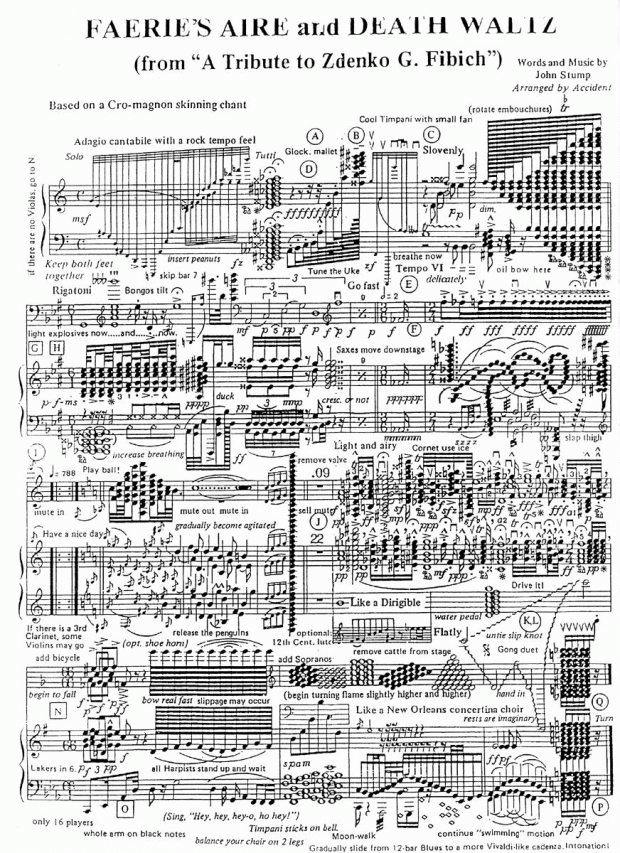As the opening frame to his final chapter on music in a postliterate society, Taruskin examines what he considers literate music’s last grasp for ultimate authority.
The music of two English composers, Brian Ferneyhough and Michael Finnissy, represents this final and—in Taruskin’s estimation—ultimately futile maneuver. Their music is typically incredibly dense on the page, and in some respects impossible to perform. Ferneyhough uses “nested rhythms” (-tuplets within -tuplets within -tuplets), and obsessively profuse articulations, giving off the general feeling of impenetrable intellectual prowess (or at the very least, committed laboring). Taruskin gives us a page of Ferneyhough’s string quartet to make his point, with the ominous assurance that this is “not an unusually complex page” for him (see the image below, which is similar to the one Taruskin uses on V, 477).
Ferneyhough and Finnissy form the core of the so-called “New Complexity” group of composers, which Taruskin baldly paints as a dead-end extension of modernism. When it comes to the notational complexity of Ferneyhough’s music, Taruskin confidently pronounces that “its intricacy set a benchmark that is never likely to be equaled, let alone surpassed.” (V, 476) That’s because this type of music is doomed. In a world “after everything,” the argument goes, literate music has been finally dethroned, with postliterate musical media taking its place.
The Ferneyhough example immediately made me think of another piece of music, which made the rounds among my musical friends several years ago. It’s a page of “notationally complex” music that, once a closer look is taken, turns out to be a gag (see image below; click for larger version).
The music pokes fun at far more than just “New Complexity” types. It’s an indictment of the whole lot of modernist (see the stacked articulations at the end of the third system) and post-modernist (“Gradually slide from 12-bar Blues to a more Vivaldi-like cadenza”) styles.
But above all it lampoons the idea that notational technology—and by extension literate music as a whole—holds the ultimate key to musical meaning. Notation has been so overburdened with meaning that it can become, well, just silly. Taruskin will press this point, and the postliterate alternatives that were developed in response to it, throughout the final chapter of his history.


I FINALLY CAUGHT YOU.
ready to start the last chapter now….
I started Volume One in September and have been reading feverishly since then.
Go go go!
what does it mean to say a style is a “dead end” or “doomed”? If even one composer writes one sucessful piece in a style, then the style is sucessful. Clearly, “new complexity” has produced sucessful pieces, and “Shadowtime” is a masterpiece by any measure. All styles run their course, so in that sense, they are all “dead ends” and “doomed”. Ferneyhough’s notation is besides the point, a simple question of writing instructions for musicians. If the music sounds good, then the notation did its job, but the notation is not the music.
Dante Rosati, the notation is not at all beside the point here. In fact notation is the starting point for composers like Ferneyhough. It’s the “thing” itself, and modernists in general care much less about how the a piece sounds. It’s impossible that Ferneyhough heard this mess in his head and then put it on paper..
Reblogged this on NQmusic and commented:
This seems interesting to me. I am gathering sources for a research paper and came across this.
Personally I dislike Ferneyhough’s pretentious unfounded alien-styled inhumane chaotic pseudo-random material, which exists only for it’s own sake and creates sensory responses that are not of the composer’s intention, but just happen to occur.
Make no mistake: Ferneyhough is no real composer; and the fact that this has never been accordingly stated or criticized shows the times in which we live: Feed the people any rubbish, with just a hint of added intellectual superiority and they’ll believe it and worship his ‘message’.
… Ferneyhough… the charlatan king of pretentious wishful implication
Seems that Taruskin here misses the point–as with the early music movement he comments only on the superficial in order to spark debate. In my opinion, the early music movement has taught us about how to hear by exposing us to different tunings and timbres, which informed the classical music we all love, even if they are played with less ornamentation than the first time around. As for Ferneyhough, I’m biased, but having heard a bunch of his music played live and a bunch of his imitators (his students) try to replicate his work and fail, I think there’s something there. Shadowtime is not successful as an opera, but listen to the writing for baritone there, or his solo flute music or electronics and cello.
Why would any sane person want to imitate Ferneyhough’s drivel? How does the failure of his students to do so (in your estimation) somehow validate the “Master” by default?
You declare a “bias” (presumably in Ferneyhough’s favour), but you neither disclose its precise nature nor give reasons for holding it.
I’m afraid that this “music” is proof positive (along with the verbal sewage of the Postmodernists and the moral lunacy of the “Social Justice” movement) that our culture is not only decadent but diseased.
Great critical comment!
+1 Agree.